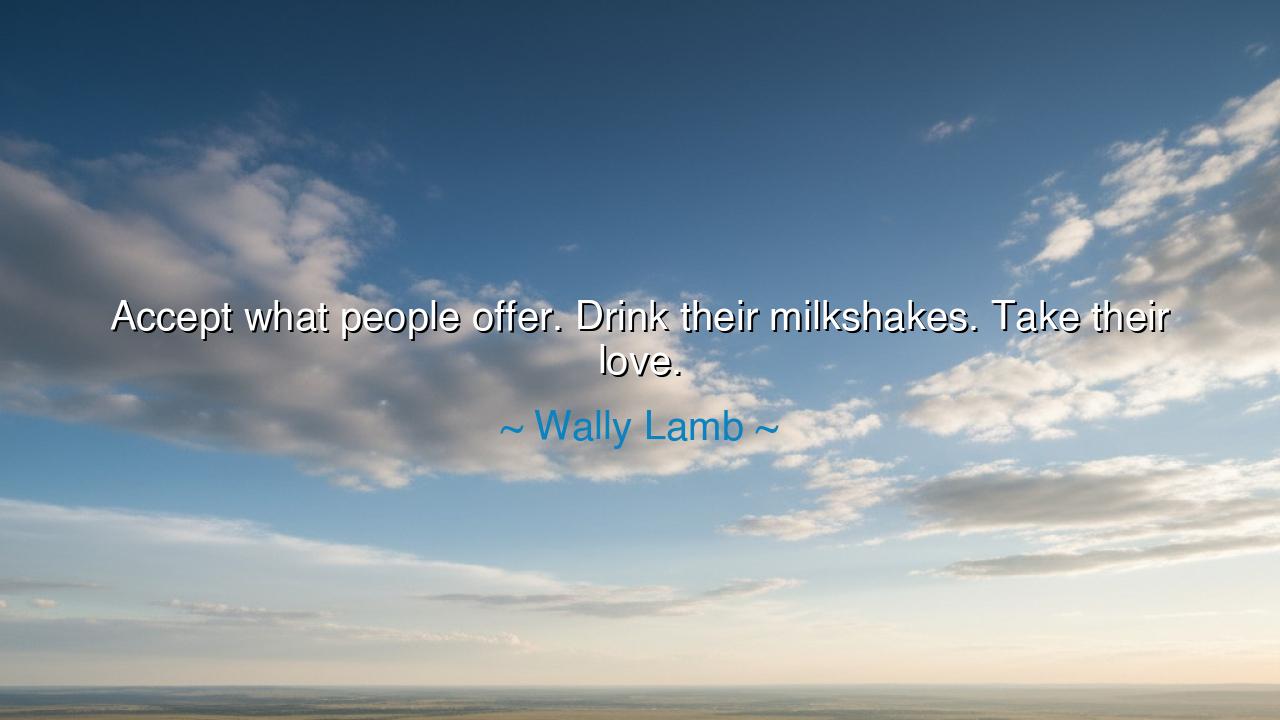
Accept what people offer. Drink their milkshakes. Take their






Wally Lamb, in his tender words, declared: “Accept what people offer. Drink their milkshakes. Take their love.” At first, these lines appear playful, almost whimsical, yet beneath them rests a profound call to humility, openness, and trust. He reminds us that life is not meant to be lived in isolation or self-denial, but in the receiving of gifts, whether simple or grand, material or emotional. To accept is as noble an act as to give, for it acknowledges the bond between souls and the sacred cycle of generosity.
The phrase “drink their milkshakes” is not about sweetness alone, but about receiving joy without suspicion, allowing ourselves to taste the ordinary offerings of others. It symbolizes embracing what is given—be it food, kindness, or companionship—without hesitation or guilt. And when Lamb says, “take their love,” he speaks to the greatest gift of all, one which many refuse out of fear, pride, or doubt. To take love is not to steal but to honor the one who gives it, to allow affection to fulfill its purpose in both giver and receiver.
History abounds with those who failed to accept what was offered and thus lived in sorrow. Consider the tale of Vincent van Gogh, who poured his heart into his art but often refused the support and love of those around him, including his devoted brother Theo. Though his canvases glowed with light, his heart remained heavy, in part because he could not fully embrace the love freely given. How different might his days have been had he truly received, not only given? His story warns us that rejecting love leaves both giver and receiver impoverished.
On the other hand, there are those who embraced the offerings of others and found strength beyond measure. The great leader Nelson Mandela, after long years in prison, emerged not hardened but softened to the gifts of his people. He accepted their trust, their faith, their hope, and in receiving these, he was empowered to rebuild a nation. His greatness was not only in his endurance, but in his ability to receive the love and loyalty of millions, transforming it into healing and reconciliation.
The lesson here is clear: do not let pride, suspicion, or fear rob you of what others long to share. To refuse a gift, whether small like a milkshake or immeasurable like love, is to deny the giver their joy and to deny yourself nourishment. In accepting, you honor their effort, their sacrifice, and their affection. Every offering carries more than its surface value—it carries a part of the giver’s spirit. To receive it with gratitude is to weave tighter the bonds of humanity.
Practical wisdom flows from these words. When someone offers you help, do not say, “I need nothing,” but instead receive and be thankful. When a friend opens their heart, do not retreat in fear, but listen and hold their love close. When a stranger offers kindness, do not dismiss it, for even the smallest act may be a lifeline. Learn to say yes to the gifts of others, for in doing so you will build bridges of trust that will sustain you in times of hardship.
Thus, children of tomorrow, remember Lamb’s teaching: accept, drink, take. Accept the bread, the laughter, the kindness. Drink deeply of the small joys that others set before you. And above all, take the love that is offered, for it is the one gift that multiplies when received. In this way, you will not walk alone, but will be carried by the generosity of others, even as you carry them with your own gifts in return. And this is no small wisdom—it is the heart of what it means to live.






AAdministratorAdministrator
Welcome, honored guests. Please leave a comment, we will respond soon